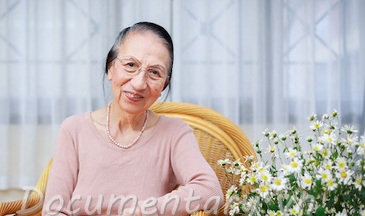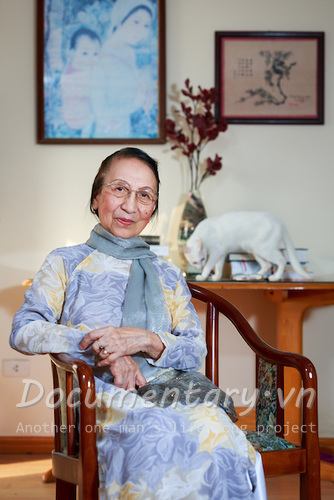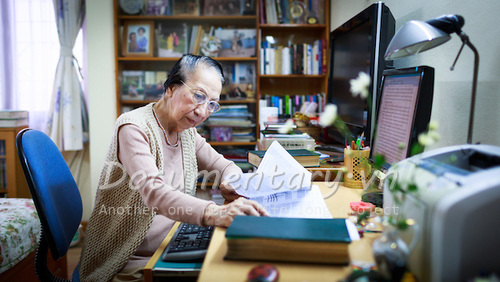

People's Teacher Le Hong Sam/Photo: Thanh Long
I remember in 1971, when I first entered the Faculty of Literature, Ms. Sam was still very young, perhaps only around 40 or 41 (I later learned she was born in 1930). At that time, being a student, I had very few opportunities to get to know her well; I only occasionally saw her from afar, and I absolutely did not dare approach her to speak. In my fragmented memory, I recall her first lectures on French realist literature as a refreshing stream that nourished our "dry" minds (I came from a rural area very far from Hanoi). During that time, when the war against America was still raging, names like Hugo, Balzac, Stanghal, or Flaubert were still completely unfamiliar, yet the first time I heard her lecture, those names suddenly became familiar. Honestly, in my student life, I rarely encountered such a captivating and engaging way of teaching. The words and language in Ms. Le Hong Sam's lectures seem to be perfectly chosen, neither superfluous nor lacking. It's as if the text has been meticulously crafted beforehand. This captivating teaching style is also evident in her everyday speech; in conversations with anyone, whether family or strangers, she is always gentle and refined.
My impression of People's Teacher Le Hong Sam was so profound for another reason: within the "warm home" of the French Literature department of the Faculty of Linguistics and Literature at that time, there was a "pair" of female teachers whose presence for a long time was like a perfect match. That "pair" was Le Hong Sam and Dang Thi Hanh. They were both remarkably similar and different. Their similarities were evident in their profound erudition, their selfless enthusiasm for their professional work, and their wholehearted love for their students. But they were also very different: one, upon first meeting her and remaining so afterward, seemed very approachable (Ms. Le Hong Sam); the other, on the contrary, seemed somewhat strict (Ms. Dang Thi Hanh). Ms. Sam, with her romantic side, taught realist literature; Ms. Hanh, with her realist side, taught romantic literature (exactly like Balzac and Hugo). When co-authoring a textbook, the title they chose evoked a gentle and interesting comparison in the reader's mind:19th-century Western Romantic and Realist LiteratureBoth are very proficient in French, but Professor Dang Thi Hanh, a distinguished teacher, revealed that she could not handle a complete translation session when professors from Paris 7 University (Republic of France) came to lecture; but Ms. Le Hong Sam did it effortlessly (and still does to this day). Even in daily office management, although Professor Dang Thi Hanh was once the principal of a very famous high school in Hanoi (Trung Vuong High School), she admitted that management was a "heavy punishment" for her; meanwhile, Ms. Le Hong Sam, besides managing the Department of Western Literature for many years, did it "as if it were nothing," and with other tasks, from her role as "coordinator" throughout the cooperation period between Hanoi University and Paris 7 University, to being the chief editor of major research and translation projects of the department, she completed everything with ease. There was no sign of hardship at all. Many of her colleagues in the Literature department, including highly respected and resourceful professors (such as Professor Ha Minh Duc, Professor Phan Cu De, etc.), had to admit: "Women like Mrs. Sam are truly rare these days."

People's Artist Lê Hồng Sâm dedicated most of her life to translating French literature. She was awarded the Order of the Academic Palms by the French Government in 2003. (Photo: Thành Long)
Professionally, it must be acknowledged that Ms. Le Hong Sam dedicated most of her life to translating French literature. Compared to her colleagues, especially those teaching Vietnamese literature at the time, Le Hong Sam's research may not be extensive, although the number of textbooks and scientific articles she has published is considerable (around 30). Readers' impressions of Le Hong Sam are likely focused on her translation work. Looking at the number of books she has translated, anyone in this field would surely be envious. In just those years, translator Le Hong Sam has published dozens of books, including some very difficult ones, nearly a thousand pages long.Confessions,Emile, or about educationby Roussau, numerous works in nearly 60 volumesThe Comedy of Life(Balzac's work...). In translating French, Ms. Sam is cautious, meticulous, and utterly responsible. For Le Hong Sam, translation work means adhering to the principle of "creative obedience." This point may seem contradictory at first, but it is entirely consistent. Like her peer, Associate Professor Dang Thi Hanh, Le Hong Sam values honesty and accuracy to the very end. While acknowledging that translation is a "difficult and arduous" task, and that many capable individuals choose to avoid it, translator Le Hong Sam, on the contrary, always considers it a great joy. She confides that this work requires listening, sincerity, and sometimes even accepting "failure." In the life of a translator, who hasn't made mistakes at least once? The important thing is to know how to correct them, to sacrifice one's ego for the accuracy of the original text. People's Teacher Lê Hồng Sâm once shared a memorable anecdote about a single word in translation with Professor Đỗ Đức Hiểu. It was the word "lueur," as Balzac wrote in...Preface to The Human Comedy“I write in the light of two eternal truths: Religion and Monarchy.” This sentence contains the phrase “à la lueur,” which someone previously translated into Vietnamese as “under the light.” Now, a senior colleague insists on changing it to “under the flickering light.” Translator Lê Hồng Sâm resolutely refuses, despite her great respect for the senior colleague’s French proficiency. However, she still feels uneasy, even though French experts later acknowledged Lê Hồng Sâm’s initial interpretation as correct. She still feels guilty towards her older colleague whom she wholeheartedly admires. If only he were still alive…
The name Le Hong Sam is now very familiar to Vietnamese Francophones. History has also given her some degree of "justice": the greatest reward for her, in my opinion, is the name she left behind (translator, cultural figure Le Hong Sam), which will surely be remembered by those who love French literature for generations to come. She was recognized by the state with the title of People's Teacher and received the Phan Chau Trinh Award, one of the most prestigious awards for translators. Ten years ago, on March 25, 2003, affirming her immense contribution in connecting French culture and spirit with Vietnamese readers, the French government awarded her the Order of the Academic Palms. She is like a tireless bird, bringing knowledge and joy to the world. I think, for a teacher and intellectual, that is more significant than any title.
|
PEOPLE'S TEACHER LE HONG SAM
+ Affiliation: Faculty of Literature, Hanoi University + Management position: Deputy Head of the Department of Foreign Literature, Faculty of Linguistics and Literature (Hanoi University) (1965-1970). Head of the Department of French Literature (Hanoi University) (1970-1988).
19th-century Western Romantic and Realist Literature(co-authored), University Publishing House, 1981. History of French Literature(5 volumes, 1500 pages) (co-editors), The Gioi Publishing House, 1990-1992. Hanoi National University Publishing House reprinted it in 3 volumes in 2005. Anthology of French Literature(Bilingual, 5 volumes, 1600 pages), The World Publishing House, 1995-1997. Life's Comedy(Editor-in-chief)by Honoré de Balzac (16 volumes, 7000 pages), Thế Giới Publishing House, 1999-2001.
+ International Education Excellence Award 2008 (Phan Chau Trinh Cultural Foundation). + 2012 Best Book Award from the Institute for Research and Development in Education (IRED) |
Author:Tran Hinh